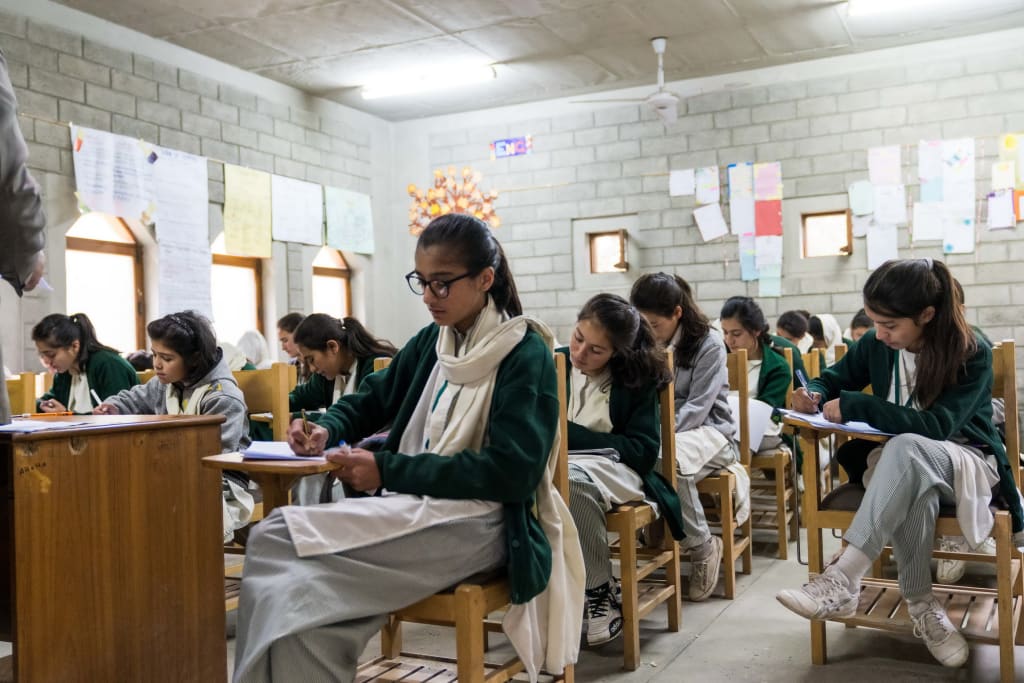Education in Pakistan: Challenges and Progress
Addressing Poverty, Gender Inequality, and Coordination to Ensure Access to Quality Education

Education in Pakistan has long been a topic of concern, with low literacy rates and limited access to quality education impacting the country's economic development and social progress. Despite efforts by the government and civil society organizations to improve education in the country, challenges remain, particularly for marginalized and disadvantaged communities.
One of the key challenges facing education in Pakistan is access. According to a report by the United Nations Educational, Scientific and Cultural Organization (UNESCO), over 22 million children in Pakistan are out of school. This is particularly true for girls, who face cultural barriers to education and are often pulled out of school early to marry or care for younger siblings.
Even for those who are able to attend school, the quality of education is often poor. Many schools lack basic facilities such as electricity, running water, and toilets, and teachers are often undertrained and underpaid. As a result, students may struggle to gain the skills and knowledge they need to succeed in their future careers and contribute to the development of their communities.
Another challenge facing education in Pakistan is the lack of funding. According to the World Bank, Pakistan spends just 2.8% of its GDP on education, far below the recommended 4-6% suggested by the United Nations. This limited funding makes it difficult to improve the quality of education, attract and retain qualified teachers, and provide necessary resources for students.
Despite these challenges, there have been some positive developments in education in Pakistan. The government has implemented a number of reforms in recent years, including the launch of a National Education Policy in 2017 and efforts to increase access to education for girls through initiatives such as the Benazir Bhutto Shaheed Youth Development Program.
Civil society organizations and international donors have also played an important role in improving education in Pakistan. Organizations such as The Citizens Foundation and Teach for Pakistan work to provide quality education to disadvantaged communities, while international donors such as the United States and United Kingdom provide funding and technical assistance to support education initiatives in the country.
Despite these efforts, there is still much work to be done to improve education in Pakistan. In order to ensure that all children have access to quality education, it will be necessary to address the root causes of low literacy rates and limited access, such as poverty, gender inequality, and cultural barriers.
Efforts to improve the quality of education will also be essential. This may include investments in teacher training and professional development, as well as the provision of resources and infrastructure to support learning.
Finally, it will be important to ensure that education is inclusive and accessible to all, regardless of gender, socio-economic status, or other factors. This will require a concerted effort by the government, civil society organizations, and the international community to address the underlying inequalities that impact access to education in Pakistan.
One of the key factors impacting education in Pakistan is poverty. According to the World Bank, nearly a quarter of Pakistan's population lives below the poverty line, and many families struggle to afford the costs associated with sending their children to school, such as uniforms and textbooks. This can lead to children dropping out of school early or never attending in the first place.
Another factor impacting education in Pakistan is gender inequality. While progress has been made in recent years to improve access to education for girls, cultural barriers still exist, particularly in rural areas. Girls may face pressure to leave school early to marry or care for younger siblings, and may not have the same opportunities for education as their male counterparts.
There is also a lack of coordination and oversight in the education sector in Pakistan. With multiple government bodies responsible for education, there is often a lack of clarity around policies and initiatives, and resources may be poorly allocated. This can lead to a lack of accountability and a failure to effectively address the challenges facing education in the country.
Despite these challenges, there are a number of promising initiatives underway in Pakistan to improve education. The Benazir Bhutto Shaheed Youth Development Program, launched in 2008, provides scholarships and vocational training to young people, with a particular focus on girls and marginalized communities. The program has helped to increase enrollment rates and improve access to education for thousands of children in Pakistan.
Other organizations, such as The Citizens Foundation, work to provide quality education to children from disadvantaged backgrounds. Founded in 1995, the organization now operates over 1,500 schools in Pakistan and has provided education to over 250,000 children.
International donors, such as the United States and United Kingdom, have also provided significant funding to support education initiatives in Pakistan. The United States has invested over $2 billion in education in Pakistan since 2002, while the United Kingdom has committed £1.3 billion to education in the country over the next four years.
In order to continue making progress on education in Pakistan, it will be important to address the underlying challenges and ensure that all children have access to quality education. This will require a multi-faceted approach, including investments in infrastructure, teacher training, and resources for students, as well as efforts to address poverty, gender inequality, and cultural barriers.
It will also be important to improve coordination and oversight in the education sector, to ensure that resources are effectively allocated and policies are implemented in a coherent and effective manner.
In conclusion, education in Pakistan is a complex issue, with multiple challenges impacting access, quality, and inclusivity. While progress has been made in recent years, there is still much work to be done to ensure that all children in Pakistan have access to quality education and the opportunity to reach their full potential. With continued investment and effort, there is hope that education in Pakistan can be transformed, paving the way for a brighter future for the country's children and communities.





Comments
There are no comments for this story
Be the first to respond and start the conversation.